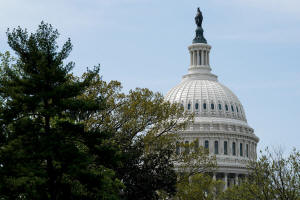Why Republican presidential hopefuls are keeping out of US debt-ceiling
squabble
 Send a link to a friend
Send a link to a friend
 [May 04, 2023]
By Gram Slattery and Tim Reid [May 04, 2023]
By Gram Slattery and Tim Reid
WASHINGTON (Reuters) - It is the one topic that everyone on Capitol Hill
is talking about and yet hundreds of miles away, on the plains of Iowa
and the hills of New Hampshire, none of the Republicans vying for the
2024 presidential nomination have even mentioned it.
The U.S. government could default on its debt in less than a month if
Democratic and Republican leaders do not arrive at a deal to raise the
nation's $31.4 trillion debt ceiling. A default, which would be
unprecedented, could cripple the nation's economy and unsettle global
financial markets.
Lawmakers in the House of Representatives have issued press releases,
passed bills and prepared legislation behind the scenes at a furious
pace in recent days in a bid to avert such a scenario. But as Republican
presidential hopefuls including Florida Governor Ron DeSantis and former
President Donald Trump crisscross the country, they have instead focused
on hot-button issues like immigration and transgender participation in
youth sports.
That is in part because the issue of the debt limit is a murky one with
the public.

A broad majority of voters in both parties believe the debt ceiling
presents a good opportunity to debate public policy priorities,
according to a Reuters/Ipsos poll conducted in March. At present,
Republicans in the House of Representatives are insisting on a package
of conservative reforms in return for raising the debt ceiling, a
position congressional Democrats and President Joe Biden reject.
But that same poll showed a wide majority of voters, including 71% of
Republicans, think both parties must reach a deal on the issue and avoid
a default to save Americans from undue financial stress.
Still, it is unclear how much Republican primary voters know about the
debt limit debate - or even care - campaign aides and strategists said.
At dueling events in New Hampshire on Thursday of last week, neither
former UN Ambassador Nikki Haley nor Trump, both presidential
candidates, brought up the issue.
Of nine attendees interviewed by Reuters at the town hall meeting held
by Haley, none mentioned the debt ceiling as one of their top concerns.
In a question-and-answer session with the former ambassador, the topic
did not come up.
In the absence of pressure from voters, candidates have stuck to
red-meat topics likely to linger throughout the primary, like
restricting the teaching of gender issues in schools.

"It's a total Beltway issue unless it goes south," said Republican
strategist Sarah Longwell, referring to a freeway outside the capital
that is shorthand for the dividing line between political insiders and
average citizens.
Venturing opinions on tricky policy matters has proven hazardous for
2024 hopefuls in the past.
[to top of second column]
|

The U.S. Capitol building is seen in
Washington, U.S., April 5, 2023. REUTERS/Elizabeth Frantz/File Photo

In March, for instance, DeSantis provoked the ire of party lawmakers
and donors for dismissing Russia's invasion of Ukraine as a
"territorial dispute," a position that he partially walked back.
There is also little upside for the White House hopefuls to get
embroiled in a fight in which everyone ends up muddied.
After weeks of rancorous partisan battles in 2011 over raising the
debt ceiling brought the country to the brink of default,
disapproval of Congress rose to an all-time high of 82%, according a
New York Times/CBS News public opinion poll published at the time.
VAGUE RESPONSES
Reuters reached out to the campaigns of Trump, Haley, former
Arkansas Governor Asa Hutchinson, venture capitalist Vivek Ramaswamy
and businessman Perry Johnson. The news agency also contacted
DeSantis, former Vice President Mike Pence and U.S. Senator Tim
Scott of South Carolina, who have not yet declared they will run but
are expected to do so.
Only Ramaswamy and Johnson, both long-shots for the nomination,
responded.
Ramaswamy said he favors tying modest spending cuts to any deal to
raise the debt limit but declined to give specifics. He said he
strongly supported creating work requirements for people to receive
welfare benefits as part of any debt-limit package.
Johnson proposed a "2-cents plan," which would eliminate 2 cents on
every dollar in discretionary spending.
Others have addressed the debt ceiling in the past, but only in
general terms.
Pence said on CNBC's "Squawk Box" in February that it was important
to maintain "the full faith and credit of the United States." He
said he "respected" House Speaker Kevin McCarthy's decision to take
cuts to Social Security and Medicare off the table.

Pence refused to be drawn in the interview on what spending cuts he
would ask for in any deal, merely repeating as he has done all year
that cuts to entitlement spending have to be made "in the long
term."
Trump, in a January video produced by his campaign, also came out
against touching entitlement programs in the context of the
debt-limit debate.
Since then, he has remained largely silent on the issue.
(Reporting by Gram Slattery in Washington and Tim Reid in Los
Angeles; Additional reporting by Nathan Layne in Manchester, New
Hampshire, and James Oliphant in Washington; Editing by Ross Colvin
and Matthew Lewis)
[© 2023 Thomson Reuters. All rights
reserved.]This material may not be published,
broadcast, rewritten or redistributed.
Thompson Reuters is solely responsible for this content. |